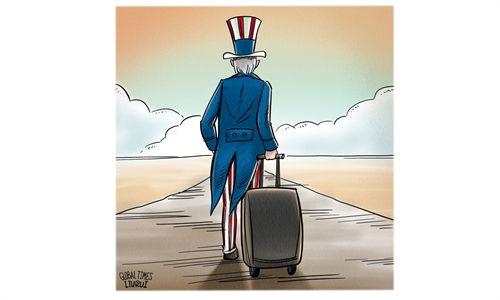
In this image provided by the UK Ministry of Defence, a Royal Air Force Typhoon FGR4 is prepared to take off and carry out Air Strikes against Houthi military targets in Yemen, on January 22, 2024. Photo: VCG
The US and UK "must be held accountable for the conduct and what is happening within Gaza," said Wikus van Rensburg (Rensburg), a South African attorney leading a group of nearly 50 lawyers in a class-action lawsuit against the two countries for their complicity in Israel's actions in Gaza. In an interview with Global Times (GT) reporter Wang Wenwen on her I-Talk show, Rensburg talked about his plan. Despite the challenges ahead, he remains positive.
GT: Why do you plan to sue the US and UK?
Rensburg: It is because we feel that the complicity by both the US and the UK, in terms of financial support as well as the military equipment provided, is unjustified, as Gaza is a nonmilitary area. Israel, in our opinion, is exceeding the boundaries of self-defense. While self-defense is acceptable to a certain extent, it becomes excessive beyond a certain point. Furthermore, their actions are not helping resolve the situation. With the continuous bombardment, the tensions are spilling over into other parts of the region. That is concerning as it could lead to a more massive aggression between different countries. You've seen the attacks in the Red Sea as an example now, and in Yemen. But Western countries are not doing anything, we feel that they are complicit in what is happening there.
GT: For a long time, there has been a lack of accountability regarding the US' actions in Iraq, Syria and Afghanistan. How will your lawsuit underscore the importance of giving due significance to this issue?
Rensburg: We will be bringing the spotlight to the issue. Germany is still paying for the World War II and the holocaust that was committed there.
To my knowledge, no other country has been held accountable like Germany for war crimes. While I cannot definitively say that war crimes are currently being committed, it is my opinion that they are. However, that is something that the ICJ (International Court of Justice) must still consider. America has been, I think, involved in over 30 to 60 wars since the World War II. No other country has got such a track record and says it is just protecting the world. Well, it's protecting its own interests and not the world.

Wikus van Rensburg Photo: Courtesy of Rensburg
GT: How confident are you in your lawsuit?
Rensburg: This will be the first such lawsuit in the world. For us, it comes down to accountability and justice. Someone must be held accountable for the conduct and what is happening within Gaza. And hopefully, if we can set a precedent, the rest of the world will take notice and not just blindly support the conduct of this nature, because there is no accountability in the world.
I would say [the probability of us winning the case] is 50 percent plus 1, to put it mildly. We feel very strongly that there is sufficient evidence out there that proves what is happening there. And America has got specific legislation which holds them accountable for supporting conduct of this nature.
The Bush administration tried to have that legislation rejected by the court in the early 2000s and was unsuccessful and that legislation still stands, which says you can sue the US government for their conduct internationally within the US courts.
GT: Have you got any feedback from the US and UK governments so far?
Rensburg: Nothing. We didn't expect a response because practicing law in South Africa and writing letters of such a nature normally doesn't elicit a response. The people or whoever you intend to sue just have a general attitude: Take me to court; until I'm in court, I don't care about what you have to say. So we'll have to wait to get them to court to see what their reaction is.
GT: You are suing the two most powerful Western countries. What challenges do you foresee?
Rensburg: Our major challenge will be money and time. We are doing it on a pro bono basis, which means the time spent at the moment is free. We're not charging for any of the time we dedicate to it. Our concern is to get our witnesses and our evidence as the case will progress eventually to court in the US and in the UK. Then we'll probably be requesting the international community for some assistance for us to present our case.
Another obstacle is time. Any litigation does take time. But by playing legal tactics and legal maneuvering, you can delay a matter. That means time is not on our side, because it takes a substantial time from one court date to another court date. I think you've seen with how Donald Trump's criminal case is being delayed. It's just an example. But ultimately, we will get to court.
GT: Besides collaborating with legal professionals in the US and UK, have you tried to seek help from anywhere else?
Rensburg: No. Myself and a colleague started discussing this, and we initiated the letters. How it started doing the rounds, I've got no idea, because I'm not on social media and I don't believe in social media. I started getting phone calls, emails, whatsapp messages from other South African practitioners. They said, "We believe in what you want to do, can we assist, can we join you?" That's when I created the whatsapp group where they started joining and we are discussing this whole concept, and they said that they'd like to help, and that's how it came about. We are getting no government assistance from the South African government.
Our matter is purely what is right and wrong. We've also been accused of being anti-Semitic, anti-Jewish, pro-Palestinian, Islamic jihad or whatever. I'm a South African, white, male, Christian. I'm probably the most unlikely candidate to run a case like this. But what is right is right, and what's wrong is wrong. We deem that they are exceeding the boundaries of self-defense. This is a matter of law and justice, not about religion.
GT: Your country, South Africa, has brought Israel to the ICJ. South Africa is a representative of the Global South. Do you think the actions of your government and people like you will help raise the voices of the Global South on the world stage?
Rensburg: I hope so. Just generally looking at the EU and America, I don't agree with their policies and practices. They look down on the southern hemisphere as insignificant countries in Africa and South America. It's about time that they do take notice of our past and our experiences, and it's about time for the rest of the world to accept accountability and responsibility.
GT: What do you think of China's position in the Israel-Palestine conflict?
Rensburg: I agree with your policy and principles you promote. There should be a cease-fire. There should be mediation, and this conflict should be resolved, because it's not to the advantage of the region nor the world and everything that is accompanied with that.
Now, China, in my opinion, has been playing an extremely brave and good diplomatic role in seeking peace, not getting involved in the conflict and all the political bickering back and forth. Some would say, China is waiting for the opportunity to pounce. I don't believe it. China's stance is very mediatory.
They are playing the correct supporting role by saying, let's talk peace and let's see if we can resolve this. Cease-fire, I totally agree with, because lives are being lost every day. It's not justified, and the conflict is just escalating. Our concern is, is it ever going to de-escalate, and if so when is it going to start to de-escalate? So I do support China's approach.


